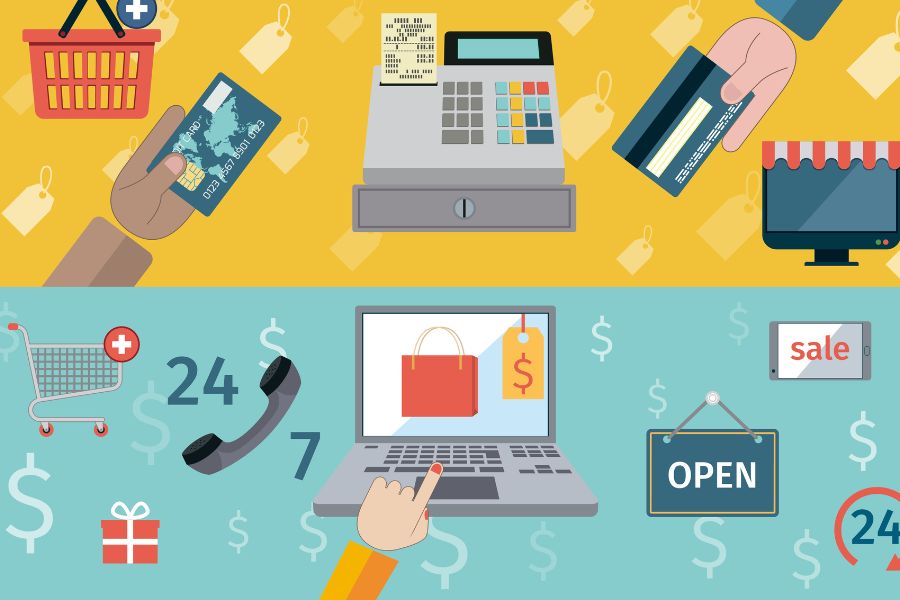Selecting the most suitable point-of-sale (POS) system for a multiple-store setup is a critical decision that can significantly impact a retailer’s operational efficiency and customer experience. In this article, we explore the different types of POS systems and analyze their strengths to help retailers make an informed choice for their multiple store setup in POS. Let’s delve into the factors that determine the ideal POS to optimize operations and drive success across multiple store locations.
Types of POS for multi-store setup
Choosing the right type of POS system for a multiple-store setup is crucial for enhancing operational efficiency, improving customer experience, and driving revenue growth.
Cloud POS Systems
Cloud-based POS systems have gained immense popularity recently due to their flexibility and accessibility. As per the data report from Salesforce, over half (54%) of retail executives have plans to embrace cloud-based POS technology by 2024.
Regarding the multiple store setup in POS, cloud POS allows retailers to centralize their operations and data management. All store locations are connected to a single cloud-based platform, enabling real-time updates and synchronization of inventory, sales, and customer data across all stores.
This ensures seamless inventory management, consistent pricing, and uniform customer experiences, regardless of the store location. Additionally, cloud POS systems offer the convenience of remote access, allowing retailers to monitor and manage their stores from anywhere with an internet connection.
Multichannel POS Systems
The multichannel POS system has become essential for businesses in a retail landscape that increasingly demands an omnichannel approach. These systems integrate with various sales channels, including physical stores, e-commerce websites, social media platforms, and marketplaces.
As reported by Statista, multichannel online retailers in the United States generated over 350 billion U.S. dollars in e-commerce sales in 2020. The figures were projected to surpass 575 billion by the year 2023.
With a multichannel POS system, retailers can centralize sales data and inventory management, providing a unified view of their operations across all channels. This enables seamless order fulfillment, consistent pricing, and synchronized stock levels, enhancing customer satisfaction and driving revenue growth.
Mobile POS Systems
Mobile POS systems offer the flexibility of conducting transactions and managing sales on mobile devices such as tablets and smartphones. They empower staff to provide personalized customer service by facilitating on-the-spot purchases, accessing product information, and processing payments from anywhere within the store.
Moreover, these systems are especially beneficial for pop-up stores or temporary setups during peak seasons. Mobile POS not only enhances customer engagement but also streamlines the checkout process, reducing wait times and boosting overall operational efficiency.
Open-source POS Systems
Open-source POS systems have emerged as a game-changer for retailers seeking a highly customizable and cost-effective solution for their multiple-store setup in POS. Unlike proprietary systems, open-source software grants businesses access to the underlying source code, empowering them to modify and tailor the POS system to suit their unique requirements.
One of the primary advantages of open-source POS systems lies in their unparalleled flexibility. Large retailers or those operating in niche industries often have specific needs that may not be fully met by off-the-shelf POS solutions. With open-source software, businesses can adapt the system to align seamlessly with their operations, ensuring a perfect fit for their diverse needs.
Moreover, open-source POS systems foster a spirit of collaboration and innovation within the retail community. Retailers can tap into a vast community of developers, programmers, and experts who continuously contribute to the improvement and enhancement of the software. This collective effort ensures that the POS system stays up-to-date with the latest trends and technologies, granting businesses a competitive edge in the fast-evolving retail landscape.
Self-service Kiosk POS Systems
Self-service kiosk POS systems have gained popularity in retail sectors like quick-service restaurants, cinemas, and supermarkets. They empower customers to browse products, place orders, and make payments independently.
These systems enhance the customer experience by reducing wait times, providing customization options, and expediting the checkout process during peak hours. For retailers, self-service kiosks can optimize labor costs and improve overall store efficiency by diverting staff from routine transactions to more value-added tasks like customer assistance and support.
Which is best for multiple store setup in POS?
Determining the “best” POS system for a multiple store setup in POS depends on various factors, including the specific needs and requirements of the business. Different businesses may have unique needs based on their size, industry, customer base, and overall objectives. Therefore, it’s essential to evaluate each type of POS system’s features and capabilities against your business’s specific needs before deciding which one is the best fit.
Here’s a summary of the strengths of each type of POS system for multi-store setups:
Cloud POS Systems:
- Best for centralized management and real-time data synchronization.
- Ideal for businesses that require remote access and flexibility.
- Offers seamless updates and backups without relying on local servers.
Multichannel POS Systems:
- Best for businesses operating across various sales channels.
- Provides a unified view of sales data and inventory across all channels.
- Enables consistent pricing and inventory management.
Mobile POS Systems:
- Best for businesses that need mobility and on-the-spot transactions.
- Enhances customer engagement and reduces checkout wait times.
- Suitable for pop-up stores and temporary setups.
Open-source POS Systems:
- Best for businesses with specific customization needs.
- Offers flexibility to modify the software to match unique requirements.
- Ideal for large retailers or those with specialized industry demands.
Self-service Kiosk POS Systems:
- Best for businesses looking to optimize labor costs and improve efficiency.
- Enhances customer experience by reducing wait times and providing autonomy.
- Suitable for quick-service restaurants, cinemas, and supermarkets.
To determine the best system for your multiple store setup in POS, consider factors such as your budget, the size of your business, the complexity of your operations, and your future growth plans.
Additionally, seeking recommendations from other retailers in your industry or consulting with POS system vendors can provide valuable insights and help you make an informed decision. Ultimately, choosing the right POS will significantly impact your business’s success and efficiency in managing multiple store locations.
Conclusion
Selecting the best POS system for multiple store setup in POS depends on the specific needs and goals of the business. Each type of POS offers unique advantages, such as centralized management, omnichannel integration, mobile transactions, customization, or self-service capabilities. By understanding these options, retailers can make an informed choice to improve operations and customer experiences across multiple store locations. If you need further information on this topic, don’t hesitate to contawhat-type-of-pos-is-best-for-multiple-store-setupct us.
ConnectPOS is a all-in-one point of sale solution tailored to meet your eCommerce POS needs, streamline business operations, boost sales, and enhance customer experience in diverse industries. We offer custom POS with features, pricing, and plans to suit your unique business requirements.




